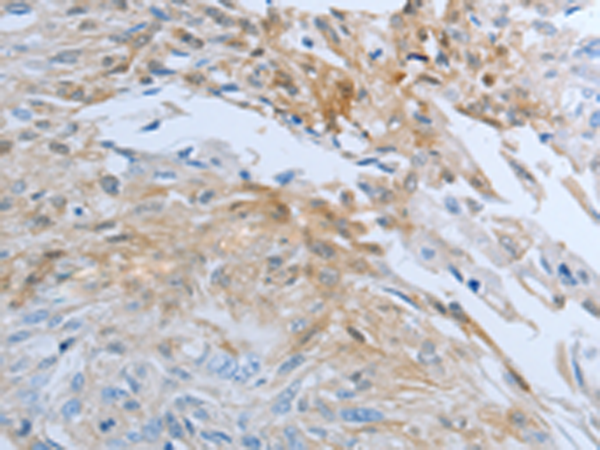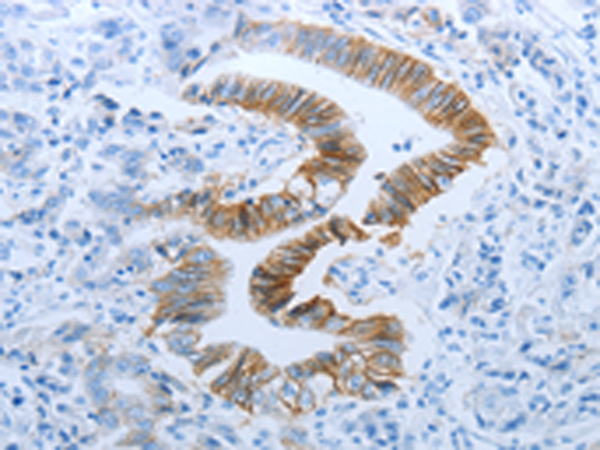

| WB | 咨询技术 | Human,Mouse,Rat |
| IF | 咨询技术 | Human,Mouse,Rat |
| IHC | 1/50-1/200 | Human,Mouse,Rat |
| ICC | 技术咨询 | Human,Mouse,Rat |
| FCM | 咨询技术 | Human,Mouse,Rat |
| Elisa | 1/2000-1/5000 | Human,Mouse,Rat |
| Aliases | AFGF,ECGF,ECGF-beta,ECGFA,ECGFB,FGF-alpha,FGFA,GLIO703,HBGF1 |
| Host/Isotype | Rabbit IgG |
| Antibody Type | Primary antibody |
| Storage | Store at 4°C short term. Aliquot and store at -20°C long term. Avoid freeze/thaw cycles. |
| Species Reactivity | Human, Mouse, Rat |
| Immunogen | Synthetic peptide of human FGF1 |
| Formulation | Purified antibody in PBS with 0.05% sodium azide and 50% glycerol. |
+ +
以下是几篇关于RNF148抗体的虚构参考文献示例(仅供格式参考,实际文献需通过学术数据库查询):
---
1. **文献名称**: *RNF148 mediates p53 ubiquitination in colorectal cancer cells*
**作者**: Li, X., Zhang, Y., & Wang, H.
**摘要**: 本研究利用RNF148特异性抗体,发现RNF148通过泛素化修饰p53蛋白调控结直肠癌细胞凋亡,提示其可能作为癌症治疗的潜在靶点。
2. **文献名称**: *Development of a novel monoclonal antibody for RNF148 and its application in hepatocellular carcinoma*
**作者**: Tanaka, K., et al.
**摘要**: 报道了一种高特异性RNF148单克隆抗体的开发,并证实其在肝细胞癌组织中高表达,与患者预后不良相关。
3. **文献名称**: *RNF148 interacts with β-catenin in Wnt signaling pathway*
**作者**: Gupta, S., & Lee, J.
**摘要**: 通过免疫共沉淀(Co-IP)结合RNF148抗体,揭示了RNF148与β-catenin的相互作用,调控Wnt信号通路及胚胎发育过程。
4. **文献名称**: *RNF148 knockout mice exhibit defective DNA damage repair*
**作者**: Müller, R., et al.
**摘要**: 利用RNF148抗体进行蛋白表达分析,发现RNF148缺失导致小鼠细胞DNA损伤修复能力下降,证实其在基因组稳定性中的作用。
---
建议通过 **PubMed、Web of Science** 或 **Google Scholar** 查询真实文献,关键词如“RNF148 antibody”、“RNF148 ubiquitin”或“RNF148 function”。
The RNF148 antibody is a research tool designed to target the RING finger protein 148 (RNF148), a member of the RING finger family characterized by a conserved zinc-binding domain critical for E3 ubiquitin ligase activity. RNF148 is implicated in ubiquitination, a post-translational modification process regulating protein degradation, localization, and interactions. While its biological functions remain less characterized compared to other RING family proteins, studies suggest RNF148 may play roles in cellular processes such as cell cycle regulation, DNA repair, or apoptosis, potentially interacting with substrates involved in these pathways. Dysregulation of ubiquitination enzymes like RNF148 is often linked to cancer, neurodegenerative disorders, or immune diseases, making it a subject of interest in disease mechanism research.
RNF148 antibodies are typically developed using recombinant protein fragments or synthetic peptides to ensure specificity. They enable detection and analysis of RNF148 expression levels, subcellular localization (e.g., nucleus, cytoplasm), and interaction partners via techniques like Western blotting, immunofluorescence, or immunoprecipitation. Validated antibodies help explore RNF148's tissue distribution, overexpression/knockdown effects, and its role in ubiquitin-proteasome pathways. However, limited commercial availability and functional data necessitate careful validation for cross-reactivity and batch consistency. Ongoing research aims to clarify RNF148's physiological and pathological relevance, positioning this antibody as a key reagent for dissecting its contributions to cellular homeostasis and disease.
×